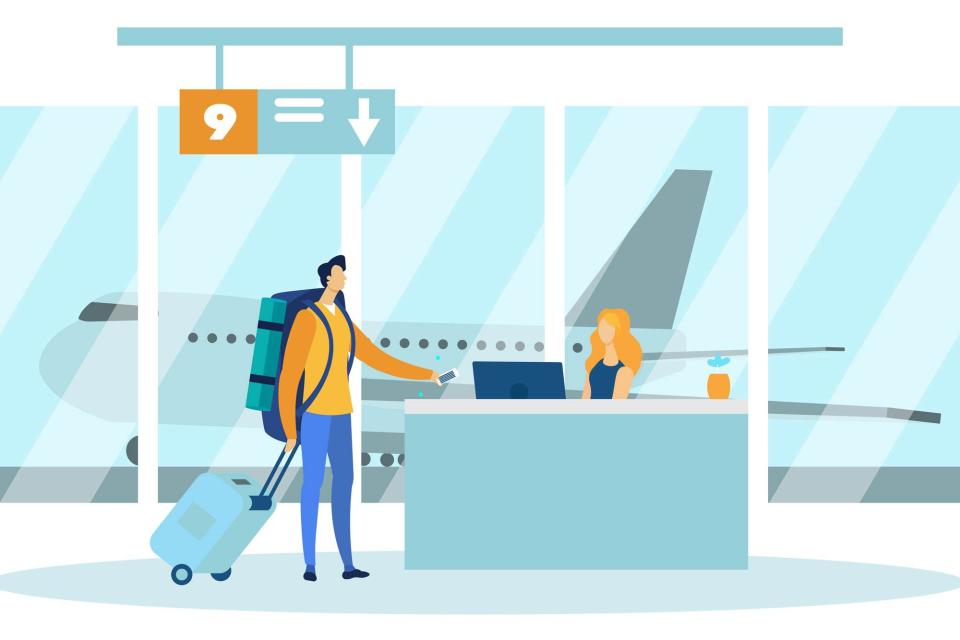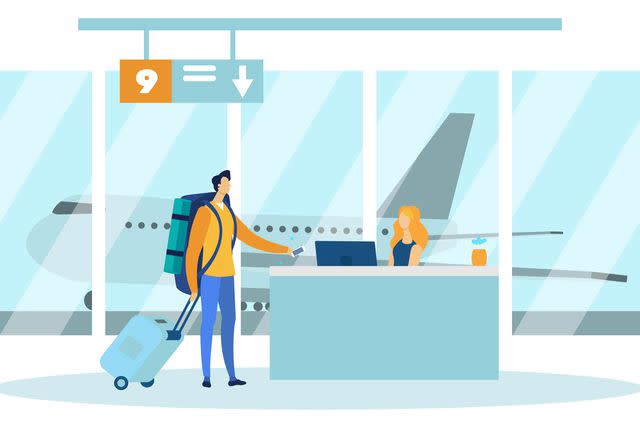All the Hidden Fees You Might Not Expect From the Major U.S. Airlines — and How Delta, American, and United Compare

Since 2008, the three U.S. legacy carriers have been adding more and more fees. These are all the hidden fees to avoid, and how United, Delta, and American compare.

Getty Images
There’s nothing more upsetting than showing up at the airport on the first day of vacation to find out you have to pay $75 to check a bag to Europe and can’t sit next to your family without paying $40 per person. In an effort to put a low upfront price tag on flights, airlines cover their costs through fees — many of which are hidden in the fine print or aren’t disclosed until the buyer has selected flights and entered their booking information.

Getty Images
The fees that turn a $300 ticket into a $500 flight have long been the norm at low-cost carriers, but now, even U.S. legacy airlines — United, Delta, and American — are packed with fees. It’s so bad that President Joe Biden proposed a new rule in September 2022 that would require airlines to be more forthcoming about additional fees. According to the proposed rule, airlines “would have to disclose up front – the first time an airfare is displayed – any fees charged to sit with your child, for changing or canceling your flight, and for checked or carry-on baggage.”

Getty Images
Until then, the best option is to know what fees exist so you can choose your ticket type and pack your bags as an informed traveler. To start, we combed through the terms and conditions for the three U.S. legacy airlines — United, Delta, and American — to unveil common fees travelers face when they checkout online or show up at the airport.
Showing Up With a Bag That's Too Heavy
Next time there’s someone repacking their entire suitcase at the check-in desk, have mercy; chances are they’re trying to save themselves $100 (or more). At all three airlines, checked bags have to be 50 pounds or under, so if a bag is 51 pounds, the traveler has to pay an extra (and unexpected) $100 or more. And if someone shows up with a bag that’s 71 pounds or heavier, they’ll get hit with a $200 charge.
Those fees remain the same on international travel with Delta, while United doubles those charges for international flights (so a 51-pound-plus bag is $200 extra and a 71-pound-plus bag is $400 extra). American holds true to that $200 charge for 71-pound-plus bags on international flights, but charges $450 per 71-pound-plus bag for travelers in China, Japan, South Korea, Hong Kong, India, and New Zealand. Phew.
United: $100 to $400, per bag, each way
American: $100 to $450, per bag, each way
Delta: $100 to $200, per bag, each way
Showing Up With a Bag That Isn't the Right Dimensions
To avoid any hidden fees in regards to bag size, your bags have to be 62 linear inches or less, a rule that applies to all three airlines. Linear inches are measured by adding together the outside length, width, and height of a bag; so, if your bag is 25 inches long, 18 inches wide, and 20 inches high, its linear inches would be 63 inches, and you’d be subject to an extra fee when you go to check your bag.
United: $200, per bag, each way
American: $150 to $200, per bag, each way
Delta: $100 to $300, per bag, each way
Checking a Bag on a Domestic Flight
Before 2008, every airline passenger could check a bag to their destination, for free. But following American Airlines’ decision to charge checked bag fees for domestic flights, everything changed. These days, if you’re flying domestically and want to check a bag, you’ll be charged between $30 and $35 for the first bag.
United: $35
American: $30
Delta: $30
Checking a Bag on an International Flight in Basic Economy
If you’re flying internationally and have an economy tier ticket or higher, a checked bag is still typically free — but basic economy travelers are the exception.
On United, basic economy travelers are currently charged $70 to check a bag to South America and $75 Europe (still free to Asia and Australia), while American charges $45 on South American flights and $75 for travel over the Pacific and Atlantic Oceans. Delta is a bit more varied, with charges running between $45 and $70 to South America, $75 to Europe, and free to Asia.
United: $70 to South America, $75 to Europe, free to Asia
American: $45 to South America, $75 to Europe, $75 to Asia
Delta: $45 to $70 to South America, $75 to Europe, free to Asia
Choosing a Seat in Basic Economy
To keep fares low, United launched the “basic economy” fare tier in 2017 and American and Delta followed suit. At first glance, these tickets look great, but like a ticket with a low-cost carrier like Spirit, they’re riddled with hidden fees. If you want to select a seat on a United or American flight, you’ll pay extra, while Delta doesn’t even allow you to choose a seat while booking, stating “your seat will be assigned after check-in (within 24 hours of departure) and assigned seats may not be together. Seat selection, when available, can be purchased seven days to 24 hours prior to departure” For a flight between Denver and Austin, the cost to choose a seat in basic economy in July 2023 starts at $34 on United and $21 on American.
United: $34+, per person, per flight
American: $21+ per person, per flight
Delta: not available upfront, sometimes available beginning seven days prior to departure
Bringing a Carry-on in Basic Economy
Here’s where the airlines diverge. With Delta and American Airlines, all travelers, including those in basic economy can bring one free carry-on and one personal item to all destinations. But on United, carry-on bags are not included in the fare — unless you’re flying to South America or across the Atlantic or Pacific. With United, you’ll pay $35 for a carry-on — the same as a checked-baggage fee on domestic flights. If you forget (or don’t know this rule), the airline states, “Everyone else who brings a full-sized carry-on bag to the gate will be required to check their bag and pay the applicable checked bag fee plus a $25 gate handling charge.” That comes to $60.
United: from $35
American: free
Delta: free
Booking or Changing a Ticket Over the Phone
If you’re trying to use a flight credit to book upcoming travel or change your flight last-minute, you might need to call the airline for help. And if you need to talk to a human at United or American, you’ll pay extra. United says: “A fee will be charged for tickets issued by United. Service charges for ticketing with a United representative in the 50 United States and Canada are $25 by phone, $30 at a City Ticket Office, and $50 in person at the airport.”
Meanwhile, there is no fee mentioned anywhere on Delta.com, and, according to an article by The Points Guy, Delta nixed their ticketing fee back in 2016.
United: $25 to book a ticket over the phone
American: $50 for changes to a trip “not initially created by American Airlines Reservations or on aa.com”
Delta: free
Flying With a Baby on Your Lap
I always thought lap infants (a.k.a. kids who fly on their parents’ lap) flew for free. It turns out, that only applies for flights within the U.S. For a United flight to London where my 1.5 year old was on my lap, I had to pay an additional $168, which covers what they call “a partial fare based on the destination.” That’s almost 18 percent of my adult fare. Delta is super clear about what they charge for infants on laps, noting that they charge “generally 10 percent of adult fare + international taxes and fees.”
American Airlines’ policy is more complicated. The airline says that “infants under 2 years old can travel at no charge in the lap of their parent,” but then notes that “taxes and a percentage of the adult fare may apply on international trips.”
United: varies, but I paid $168 (18 percennt of adult fare) to get to London
American: varies, but for international flights, there is likely a charge
Delta: 10 percent of adult fare plus taxes and fees
For more Travel & Leisure news, make sure to sign up for our newsletter!
Read the original article on Travel & Leisure.